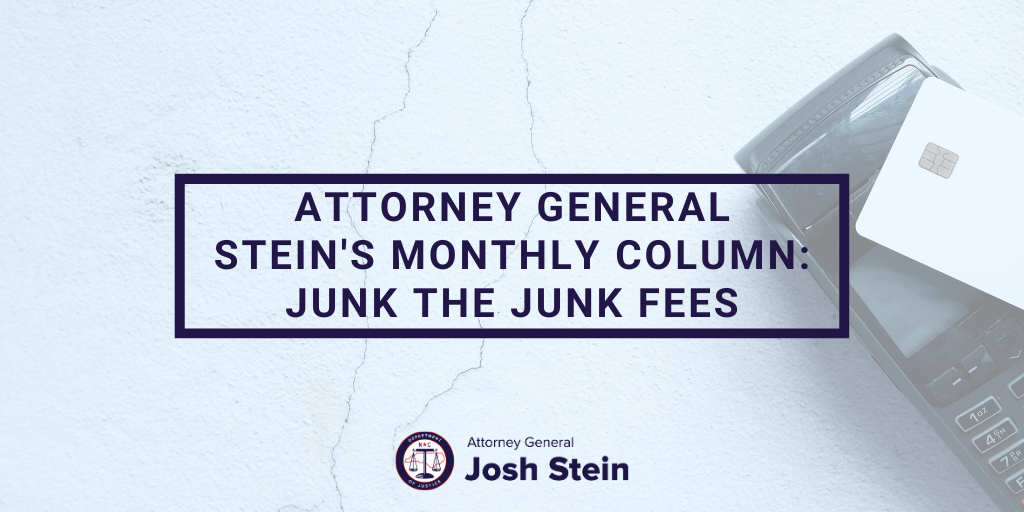
August 2023
People all over North Carolina are grappling with higher prices. It’s one thing when input costs go up, but it’s another thing altogether when we find hidden fees tacked on to purchase after purchase – hotel bills, concert tickets, bank accounts, and so many others. Your hard-earned money is even more precious in today’s economy, and I’m fighting to keep it from going down the drain in junk fees.
These “junk” fees are any added cost to a good or service that isn’t usually listed in the original sticker price. If you’ve ever booked a vacation or bought a concert ticket and noticed the final cost was much higher than what was advertised, chances are you were hit with some junk fees. Some junk fees are rip-offs that are deceptive and harmful to competition. Last year, the White House and the Consumer Financial Protection Bureau (CFPB) announced an initiative to put an end to junk fees. If you know the full cost of something up front, you can shop around and save money. As your attorney general, I’m working to fight junk fees so you can keep more money in your pocket.
Here are some steps you can take to avoid wasting your money on hidden junk fees:
Read carefully. Before proceeding with payment or signing any purchase agreements, make sure you read the terms of sale carefully. Look for key words like “maintenance fee” or “servicing fee” that indicate your purchase might include junk fees. If you don’t like the extra fees, ask whether they can be removed and don’t be afraid to walk away from the transaction.
Pay with a credit card. When possible, avoid using a debit card if you are worried about junk fees that may be tacked on to your purchase. If you pay by credit card, hidden fees and other purchases are generally easier to dispute.
Shop around. Research businesses and institutions that don’t include junk fees before spending your money. There are banks that don’t require service fees or overdraft fees and hotels that don’t charge resort fees.
Negotiate. Sometimes asking a business to remove its junk fee may pay off, especially if you don’t plan on using any services associated with the fee (e.g., a hotel “resort fee”).
Monitor your bank and financial accounts and pay your bills on time. This may help you avoid bank fees charged for insufficient funds, overdrafts, or late payments.
Ask questions. If you are unsure about what fees, if any, are included in the cost of a good or service, be sure to ask about the fine print. Take note of the name of anyone you speak with. This can help you dispute a junk fee down the road if needed.
Consumers deserve full, upfront disclosure from businesses, and I will continue to fight for transparency and consumers’ rights. If you believe you’ve been wrongfully charged for a hidden or misleading fee, call my office at 1-877-5-NO-SCAM or file an online complaint at www.ncdoj.gov/complaint. You can also submit complaints about junk fees and about financial products and services, by visiting the CFPB’s website here: https://www.consumerfinance.gov/complaint/ or by calling (855) 411-CFPB (2372).
